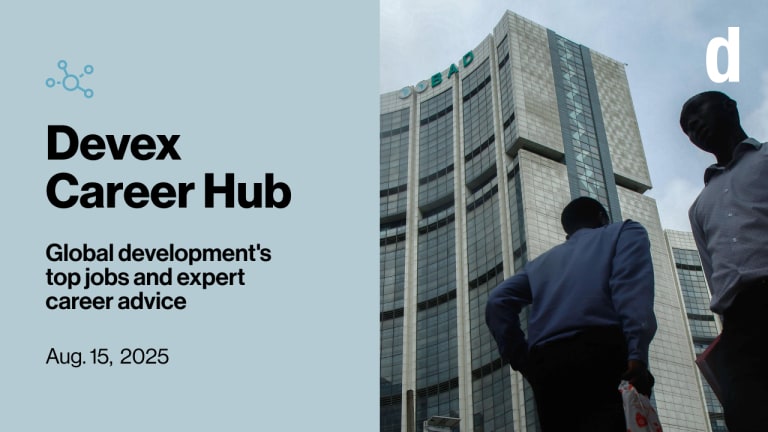
International organizations want to see innovation as an essential function of their workplace, and for some time, major bilateral donors and multilateral agencies have been working independently — and now together — to fund innovations and spur creative, pioneering interventions to tackle global development challenges.
In fact, the increasing number of innovation positions in international cooperation require candidates from a vast range of disciplines with a knack for understanding the global development agenda and the ability to build — or help colleagues build — forward-thinking solutions to complex challenges.
Now, to keep up, it’s time for human resources staff and recruiters to embrace innovation in everything from building pipelines to developing talent.
The 2014 International Organizations’ Career Development Roundtable in Oslo, hosted by the Norwegian Ministry of Foreign Affairs, will convene stakeholders from multilaterals — in particular from the United Nations system — the European Union, international financial Institutions as well as stakeholders in both the public and private sector to discuss just that.
The event has grown each year since its inception 10 years ago, and recorded approximately 180 participants from more than 80 organizations — with a cumulative workforce of approximately 250,000 staff — during the 2013 event in London.
With a solid focus on professionalizing HR in the multilateral sector, this year, the roundtable will enable the sharing of best practices, policies, tools and ideas as they relate to innovation in the workplace.
Here are four themes to anticipate exploring at this year’s roundtable:
1. Creating a culture of innovation in the workplace
International organizations are faced with a relentless flow of challenges that require fast actions and planning in an effort to maintain competitive advantage. Under such pressures, new ideas are often difficult to come by and the sought-after “innovative culture” can be lost.
Margaret Mangion of the University of Malta is one of many speakers who will address this issue in her clinic to shed light on acquiring new methods of idea-generation, both individually and in groups.
But even with management on board for innovating, creating the right team to respond to emergencies and crises is difficult in the best of times. Allan Freedman will explore how to capitalize on private sector expertise and team diversity in building innovative teams during his panel.
Assessing impact related to the adoption of an innovation in the public sector also presents a separate challenge, and will be addressed by Greta Nasi, director of the Public Management and Policy Department at SDA Bocconi School of Management.
2. Taking a closer look at innovative practices
International organizations and corporations are innovating at a rapid rate, but both struggle to take full advantage of existing knowledge accumulated by experts in various locations.
In one of many sessions that will shed light on current innovation as well as knowledge sharing, Jon Lervik of the BI Norwegian Business School, attendees will take a look at how multinational corporations facilitate knowledge exchange and discuss its transferability to international organizations.
Jessica Silberman Dunant of the International Committee of the Red Cross will use ICRC as a case study and share the organization’s year-long journey to review their international assignment process, while Olivier Salles of the European Commission will present on how to set up an E.U.-wide, efficient organization in 6 months — from scratch. He’ll also touch on how to attract specialized staff from both the public and private sector. Expect takeaways for lessons learned that can enhance urgent HR tasks throughout your own institution.
3. A focus on excellence in the workplace
There must be a complementary balance for innovation, Michael Emery, director of the division for human resources for the United Nations Population Fund, told Devex of the event. Of course, it’s not just about innovating, but excelling in the work you do.
It’s an issue that Grete Faremo, executive director of UNOPS, will touch on during her keynote on Friday, Nov.14.
But prior to that, David Bearfield, director of the European Personnel Selection Office for the European Commission, will present: “It ain’t (just) what you do; it’s the way that you do it – that’s what gets results,” where attendees will gain insight into the critical importance of not just having the right selection and recruitment procedure in place, but also demonstrating its value in order to help drive the organization forward.
And Bård Kuvaas, a professor in the Department of Leadership and Organizational Behaviour at the BI Norwegian Business School, will tackle the topic of performance management and present research-based advice on how to conduct more developmental performance management in organizations.
4. Networking around innovation
The goal of the event is to spark conversation and encourage organizations to continue to share best practices and new ideas, so be sure to follow up with everyone you meet after the event, especially since attendees are the representatives from their organizations who want to innovate, sharpen their own work and act as change agents.
During the roundtable, take advantage of the coffee breaks sprinkled throughout the agenda to make new contacts — they were put there purposely to provide space and time for just that, Emery said.
Attendees should leave the two-day roundtable with two or three things that they can take back to their workplace,” Emery said, whether that’s a new contact or a new management technique.
In another effort to honor great ideas and share best practices, CDR participants were invited to submit their initiatives for an award in “Innovation in Recruitment” as well as in “Innovation in Talent Development,” which will be presented at the roundtable in Oslo.
Check out more recruiting insight stories, subscribe to Doing Good to receive top international development career and recruitment news or join the Devex LinkedIn group for recruiters.
Read more articles on recruiting insights:
● Ebola: An HR, recruitment 'worst case scenario'
● Psychometric testing: Will it become the new normal in foreign aid recruiting?
● Attracting talent from the 'global south': Are you doing enough?








